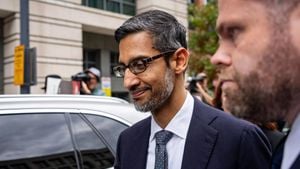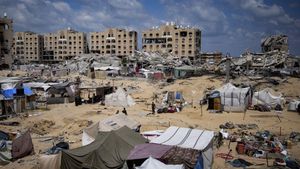Recent events surrounding the attacks on Hindus and Hindu temples in Canada have escalated diplomatic tensions between India and Canada, drawing strong reactions from leaders and communities on both sides. The series of violent incidents emphasizes the alarming trend of religious intolerance and violence against Hindus, particularly by pro-Khalistani groups, leading to widespread condemnation from various quarters.
On November 4, 2024, Prime Minister Narendra Modi expressed grave concern over the "deliberate attack" on the Hindu Sabha Temple located in Brampton, Ontario. He emphasized through social media, stating, "I strongly condemn the deliberate attack on the Hindu temple. Equally appalling are the cowardly attempts to intimidate our diplomats. These acts of violence will never weaken India’s resolve." Modi also called upon the Canadian government to uphold the rule of law and provide justice.
The Ministry of External Affairs (MEA) echoed Modi's sentiments, issuing statements highlighting its deep concerns about the safety of Indian nationals in Canada following the violence orchestrated by Khalistani extremists. MEA spokesperson Randhir Jaiswal called for accountability, saying, "We condemn the acts of violence perpetrated by extremists and separatists at the Hindu Sabha Temple. We also expect those indulging in violence will be prosecuted." This call for justice emphasizes India's insistence on maintaining its citizens' safety abroad, particularly amid rising anti-Indian sentiment on foreign soils.
Witnesses have recounted the chaotic scenes at the temple where protests escalated. Video footages revealed pro-Khalistan protestors surging through the temple's main entrance and clashing with devotees, resulting in physical altercations. The situation turned extremely hostile as these protestors reportedly assaulted temple members, leaving the local Hindu community both shaken and demanding government action.
Reacting to the violence, the Canadian National Council of Hindus (CNCH) and other Hindu advocacy groups have begun to take more assertive measures. They announced stricter guidelines for political engagement with Hindu temples, stating, "Hindu temples and institutions across Canada will no longer permit politicians to use temple facilities for political purposes without demonstrating concrete measures addressing the issue of Khalistani extremism." This directive highlights the community's growing urgency to protect their places of worship.
Canada's political response has varied, with prominent politicians voicing their concerns over the incident, including Prime Minister Justin Trudeau, who stated those acts of violence were "unacceptable." He thanked local law enforcement for their response and promoted the idea of safe practice of faith for all Canadians, signaling to the Hindu community and global observers his commitment to address their safety concerns.
These violent occurrences come against the backdrop of already strained diplomatic relations between India and Canada, significantly exacerbated by accusations hurled by the Canadian government about Indian agents being involved in politically charged assassinations. The October allegations involving India's Home Minister Amit Shah, alongside claims of surveillance on Indian diplomats, have stirred public discourse, emphasizing the tug-of-war between two nations over issues of national sovereignty and community safety.
The recent surge of violence against Hindus has raised alarms not only among community leaders but also within the broader fabric of Canadian society, where religious tolerance and acceptance are often upheld as cornerstones. Incidents like the one at the Hindu Sabha Temple remind many of the fragility of this social compact and the potential for divisive ideologies to erupt.
Overall, the attacks signify not only the conflict at hand but also the broader inquiery about how communities can coexist peacefully without the shadows of extremism overshadowing their communal lives. Indian officials and community advocates are calling for more proactive measures from the Canadian government to secure their places of worship and protect minorities against rising extremism. The path toward healing and restoring trust will require firm commitments from both citizens and leaders to uphold peace and security across all faiths.
While the Hindu community's demands grow louder, the backdrop of heightened political rhetoric continues to simmer. The situation remains fluid, with the international community observing closely how Canada handles the rising tide of radicalism within its borders and how India navigates the troubled waters of foreign relations with safety for its nationals at stake.



